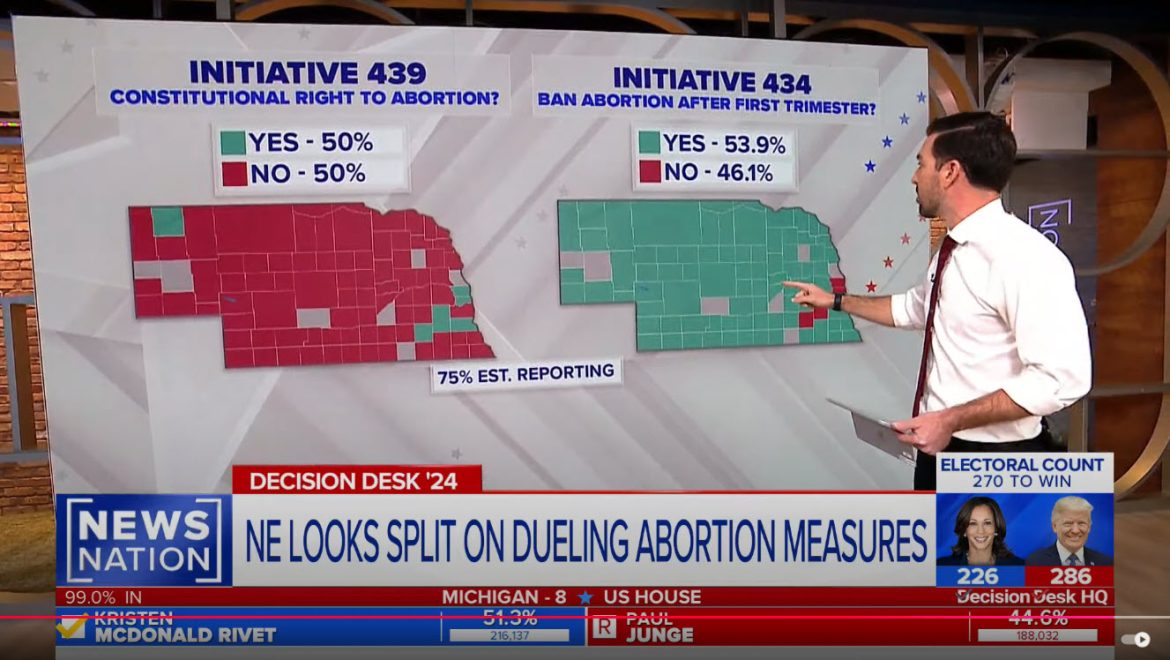In a significant national referendum on abortion rights, voters in ten states cast their ballots on measures to either protect or limit access to abortion. As the results come in, eight of these states have approved constitutional amendments to enshrine abortion protections, while two states—South Dakota and Florida—rejected measures that would have expanded access, signaling a diverse range of views on this highly contentious issue.
The measures approved by voters in Arizona, Colorado, Nebraska, Maryland, Missouri, Montana, Nevada, and New York establish various degrees of protection for abortion access within their state constitutions. These changes reflect a growing trend in states taking definitive action on reproductive rights, particularly following the U.S. Supreme Court’s 2022 decision to overturn Roe v. Wade, which ended federal protections for abortion.
Nebraska and the Nuances of Abortion Protection
In Nebraska, two separate measures regarding abortion were on the ballot, with mixed results. Voters approved a measure that protects access to abortion in the first trimester, affirming reproductive rights early in pregnancy. However, a second measure, which aimed to extend abortion access until fetal viability, failed to gain enough support. This outcome in Nebraska represents a compromise that respects both sides of the abortion debate, allowing early pregnancy access but stopping short of broader protections.
South Dakota and Florida Hold Firm on Abortion Restrictions
South Dakota voters decisively rejected a measure that would have provided constitutional protections for abortion, opting instead to maintain the state’s near-total ban. Currently, South Dakota has one of the most restrictive abortion laws in the country, with exceptions only for cases where the mother’s life is at risk. Advocates for the measure had argued that constitutional protections were essential for safeguarding women’s health and autonomy. However, opponents of the measure emphasized their commitment to protecting what they consider the rights of the unborn, leading to the measure’s defeat.
In Florida, a similar measure also failed, meaning the state’s existing six-week abortion ban will remain in effect. The outcome reflects a deeply polarized electorate on the issue, as Florida has historically been a battleground for both progressive and conservative causes. Florida’s six-week ban is among the strictest in the country, drawing both national attention and legal challenges.
Widespread Approval in Other States
In Arizona, Colorado, Maryland, Missouri, Montana, Nevada, and New York, voters approved constitutional amendments to safeguard abortion rights, a development advocates describe as a victory for reproductive freedom. Each state has established its own specific terms of protection:
- Arizona and Missouri both approved measures that will protect access to abortion services up until the point of fetal viability, a standard often associated with a 20-24 week threshold.
- Maryland and Nevada voted to enshrine broader reproductive rights, with language protecting individuals’ right to privacy in reproductive healthcare decisions.
- Montana and Colorado passed measures that similarly provide expansive protections, effectively safeguarding access to abortion services and reducing the likelihood of restrictive laws taking hold in these states.
- New York, in particular, approved a comprehensive amendment, marking a major commitment to reproductive rights by establishing access to abortion as a fundamental right in the state constitution.
In all eight of these states, the measures were met with support from voters who believe abortion access should be protected against fluctuating political tides. Many of these states are already seen as leaders in reproductive rights, and these new amendments make it more difficult for future state legislatures to impose restrictive abortion laws.
Implications and National Response
Political analysts say these results reflect a shift in public opinion toward preserving abortion access at the state level, especially in regions that have traditionally leaned toward more liberal social policies. As the federal government’s stance on abortion continues to evolve, states are stepping in to create legislation that reflects the values of their residents. Advocacy groups, both for and against abortion rights, see these results as a bellwether for future elections, noting that abortion rights have proven to be a mobilizing issue for voters across the spectrum.
Abortion rights advocates have celebrated the victories in these eight states as a win for bodily autonomy and health freedom. “These results show that Americans overwhelmingly support a woman’s right to make decisions about her own body,” said Diana Torres, a spokesperson for the reproductive rights organization Women’s Health Advocates. “We’re seeing the people, not politicians, leading the way in defining the future of reproductive healthcare.”
On the other side, anti-abortion groups expressed disappointment but vowed to continue their fight. In South Dakota, the advocacy group Protect Life South Dakota released a statement saying, “We are proud of South Dakota voters for upholding the values of our state. We will continue to work to protect the lives of the unborn and offer support to pregnant women in our communities.”
As states continue to clarify their positions on abortion through referendums and legislation, the patchwork of abortion laws across the United States is expected to become more defined. With eight states now enshrining abortion protections and others maintaining or expanding restrictions, the regional differences in abortion access could become more pronounced, affecting access to care for individuals in restrictive states who may seek services across state lines.
This election’s results illustrate the diversity of views on abortion across the country, highlighting a shifting landscape that reflects voters’ desires to have a direct say in reproductive rights. The continued presence of abortion measures on ballots nationwide is anticipated in future elections, as states on both sides of the debate look to solidify their stance on one of the most divisive issues in modern American politics.



